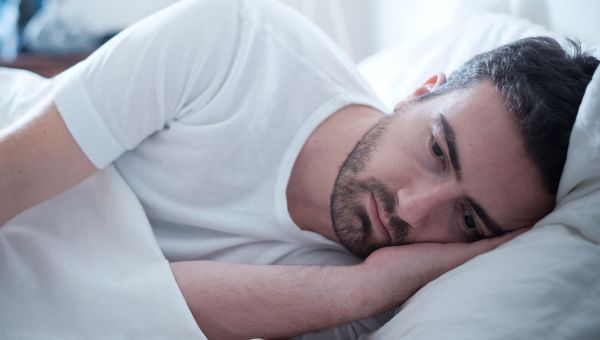4 common bipolar triggers and how to manage them
Life events and habits can make bipolar episodes worse, or even prompt a relapse.
Updated on October 22, 2024

About 8 million adults in the United States have bipolar disorder, a condition that causes changes in mood that are disruptive to everyday life. Nearly 83 percent of people with bipolar have a severe case, which means they report experiencing serious impairments to their work, social life, or family life. Bipolar disorder affects men and women equally. While it can occur at any age (even during childhood), the average age of onset is 25.
There is no single known cause of bipolar disorder, but experts agree that certain factors, like genetics, stress, and brain structure, may increase a person’s risk. Even though there are many treatments for bipolar disorder, certain life events and habits can make bipolar episodes worse or can cause a relapse, which is a recurrence of episodes.

Mood changes and bipolar episodes
Most people experience sadness, sleeplessness, and lack of concentration during their lifetimes. But people with bipolar disorder experience these moods with greater intensity and in cycles. There are three different types of mood episodes associated with bipolar disorder. These include:
- Manic: These episodes can bring about insomnia, concentration problems, racing thoughts, or the feeling that you can conquer the world. A manic episode may also make you feel irritable.
- Hypomanic: These high-energy episodes involve symptoms similar to manic episodes, but with less severity and lasting for a shorter duration of time. (While a manic episode may last a week or more, a hypomanic episode may last for a few days.)
- Depressive: During this type of episode, you may feel a strong sense of sadness and hopelessness for at least two weeks at a time and you may feel a loss of interest or pleasure in things you once enjoyed.

Understanding the types of bipolar disorder
In addition to the various episode types, there are different types of bipolar disorder. The three major types are:
- Bipolar I disorder is when a person has at least one severe manic episode. Having a depressive episode is also common with bipolar I.
- Bipolar II disorder is when a person has at least one depressive episode and one hypomanic episode.
- Cyclothymic disorder usually involves a combination of mild depressive episodes and hypomanic episodes that last for at least two years. This is considered the milder form of bipolar disorder.
Four other types may be present:
- Substance/medication-induced bipolar and related disorder involves mood disturbances that are triggered by drugs or medications.
- Bipolar and related disorder due to another medical condition features symptoms of bipolar that are triggered by a medical illness or condition.
- Other specified bipolar and related disorder means having bipolar-like symptoms but—for a known reason—they do not meet the criteria required to be diagnosed with one of the other types.
- Unspecified bipolar and related disorder is just like the specified type, except the reasons why the symptoms don’t meet diagnostic criteria aren’t known or specified.
Regardless of the bipolar type, it’s important to be on the lookout for everyday triggers.
“Bipolar disorder can be exacerbated by many different factors,” says Cesar Figueroa, MD, a psychiatrist in Macon, Georgia. Read on for information on bipolar episode triggers, common treatments, and ways to avoid these episodes.

Stress
In general, people with bipolar disorder have a harder time managing stress than people without the condition. They may have difficulty coping with situations and may interpret otherwise insignificant events as stressful. High stress levels can cause depressive, manic, or hypomanic episodes, as well as anxiety and anger.
To avoid stress-related bipolar issues, try incorporating stress reduction techniques into your lifestyle. Recognizing patterns in your episodes will help you partner with your healthcare provider (HCP) in identifying the best treatment plan. Psychotherapy, a treatment where your mental health provider will help you build healthy habits, is often the preferred method of treatment.
Journaling—writing down stressors or other things on your mind—may be one of the exercises your therapist suggests, says Dr. Figueroa. Taking note of the events, people, or places that cause you stress may help you understand the triggers that might go unnoticed otherwise.
Try to surround yourself with people who lift your mood. A healthy relationship with a relaxed friend or loved one can help you stay calm, as opposed to a friend who often causes drama or stress, which can exacerbate bipolar episodes.

Lack of sleep
A significant change in sleep patterns is a symptom of bipolar disorder. Changes to your sleep-wake cycle, or circadian rhythm, can also trigger a bipolar episode, according to a 2023 systematic review published in the Journal of Psychiatric Research. For those with bipolar disorder, shift work, travel, and restless nights may lead to an increased risk of unstable mood episodes.
Although lack of sleep should generally be avoided, in some cases not sleeping can act as an effective interventional therapy. A 2020 systematic review and meta-analysis of seven studies published in the journal Frontiers in Psychiatry found that in some instances when healthcare providers (HCPs) prescribe “total sleep deprivation” (TSD) in addition to medication, symptoms of depression lessened in strength and then improved for months.
However, outside of carefully monitored and prescribed TSD, it’s important to aim for seven to nine hours per night. Getting too much sleep can cause your energy levels to drop. Here are some ways to keep your sleep-wake cycle consistent:
- Maintain a regular schedule, waking and sleeping at the same time every morning and night.
- Get some sunlight first thing in the morning; opening your blinds or taking a quick walk around the block will do.
- Exercise daily.
- Limit caffeine and alcohol consumption.
If you notice any changes in your sleep, talk with an HCP about what may be causing the interruption.

Drug use
It’s difficult to pinpoint exact numbers, but population surveys have shown that approximately 50 percent of people with bipolar type 1 also have either substance or alcohol use disorder.
In many cases, those with bipolar disorder may use drugs or alcohol to try and ease symptoms like anxiety, pain, depression, and sleeping problems. But in general, alcohol and drugs cause more emotional instability and worsen all bipolar symptoms.
Cannabis (“pot”) may seem like a harmless and common drug of choice, but for people with bipolar it is linked to worse symptoms, including increased suicidal behaviors. Cannabis may even be linked to the development of bipolar disorder, but more research is needed to understand this link.
Opiates may temporarily ease mood swings but will likely make things worse later on, and people with mental health conditions are at a higher risk of overdose. Stimulants like amphetamines and cocaine can send people with bipolar disorder into a manic episode or make a manic episode last longer. Psychedelics can trigger symptoms, too, when taken outside of clinical settings. Psilocybin (“magic mushrooms”) can induce manic symptoms, anxiety, and trouble sleeping, according to survey results published in the Journal of Psychopharmacology in 2023.

Alcohol use
Alcohol depresses the central nervous system and contributes to depressive symptoms. Because alcohol alters a person’s awareness and inhibition, it’s especially dangerous for people with bipolar disorder. And people with bipolar disorder who also have alcohol use disorder will usually experience much worse symptoms, including more intense depression, more frequent mood cycling, and slower recovery from episodes. It may also make a person with bipolar act more impulsively and feel more anxious.
If you have bipolar disorder, it’s best to abstain from alcohol completely. If you do choose to drink, stick to one glass a day or less. And if you’re taking any medications for bipolar disorder, consult with an HCP about whether you can have a drink. Mixing alcohol with bipolar and anxiety medications (often taken by people with bipolar disorder) can cause serious issues that include:
- Dizziness
- Increased risk for falls
- Drowsiness
- Dangerously slowed breathing
- Confusion and poor judgment
If you find yourself reaching for alcohol or drugs when times get difficult or when you’re in situations that make you feel uncomfortable, it’s a sign to seek treatment from a mental health professional. You can also contact the Substance Abuse and Mental Health Services Administration (SAMHSA) National Helpline at 1-800-662-HELP (4357) to learn about treatment centers and local support groups near you.

Nicotine use
Smoking is unhealthy for everyone, because it causes cancer and raises the risk for heart disease and other serious health conditions. Nicotine dependence (being addicted to smoking) is also linked to more severe experiences of psychosis in people with bipolar I. People with bipolar who smoke are also more likely to have more agitation and impulsive behaviors, more suicide attempts, and more instances of hospitalization. Smoking may even speed up the age of onset of bipolar disorder.
The reasons for this may have a lot to do with the brain. Smokers who have bipolar disorder may actually damage neurons in the brain, and cause inflammation. Smoking can also be linked to further substance misuse and addictions, which can cause many other health issues.

Pregnancy and childbirth
According to a 2024 review and meta-analysis published in the Journal of Clinical Psychiatry, about 2.6 percent of pregnant people who have not been previously diagnosed with a psychiatric illness will develop bipolar disorder while pregnant. In those who had a bipolar diagnosis before getting pregnant, about 55 percent had a bipolar mood episode during the perinatal period – the time during pregnancy and up to a year after.
During pregnancy, most people experience worries or anxieties about things like becoming a parent, the health of their pregnancy, and the financial commitment it takes to raise a family. Fatigue and changes in hormone levels or metabolism can contribute to such feelings. These same anxieties may continue (or even escalate) after a baby is born, triggering a relapse of bipolar episodes.

Treating bipolar during pregnancy
In general, it can be difficult to weigh the risk and benefits when it comes to treating mental illness during pregnancy. That’s why it’s important to talk with an obstetrician/gynecologist (OBGYN) and mental health professional to determine the right treatment plan. Common bipolar medications—like lithium, valproic acid, paroxetine, and carbamazepine—are associated with an increased risk of fetal differences and problems, so experts recommend that other pregnancy and postpartum treatments be considered before conception, in consultation with an HCP. They may advise going down to a minimum effective dose, stopping a medication for just the first 12 weeks of pregnancy, or gradually substituting a riskier medication with a safer one.
You can also try these natural ways to help control bipolar-related mood swings:
- Take time to relax.
- Get regular exercise.
- Take naps when you’re feeling tired.
- Try yoga or meditation classes.
- Practice healthy eating habits.
Remember that bipolar disorder is manageable both during pregnancy and postpartum. Following your treatment plan and minimizing your exposure to triggers as much as possible can help you prevent more frequent, severe, and longer episodes.

Nierenberg AA, Agustini B, Köhler-Forsberg O, et al. Diagnosis and Treatment of Bipolar Disorder: A Review. JAMA. 2023 Oct 10;330(14):1370-1380.
National Institute of Mental Health. Bipolar Disorder. Page accessed June 24, 2024.
Harm Research Institute. Sheehan Disability Scale (SDS). Page accessed June 24, 2024.
National Alliance on Mental Illness. Bipolar Disorder. Page accessed June 24, 2024.
Mayo Clinic. Bipolar Disorder. Page last reviewed December 13, 2022.
American Psychiatric Association (2022). Bipolar and related disorders. In Diagnostic and statistical manual of mental disorders (5th ed., text rev.).
Umeoka EHL, van Leeuwen JMC, Vinkers CH, et al. The Role of Stress in Bipolar Disorder. Curr Top Behav Neurosci. 2021;48:21-39.
International Bipolar Foundation. Getting a Handle on Stress When You Have Bipolar Disorder, Part 2: The Connection Between Stress and Bipolar Disorder. Page accessed June 24, 2024.
Rodrigues Cordeiro C, Côrte-Real BR, Saraiva R, et al. Triggers for acute mood episodes in bipolar disorder: A systematic review. J Psychiatr Res. 2023 May;161:237-260.
Ramirez-Mahaluf JP, Rozas-Serri E, Ivanovic-Zuvic F, et al. Effectiveness of Sleep Deprivation in Treating Acute Bipolar Depression as Augmentation Strategy: A Systematic Review and Meta-Analysis. Front Psychiatry. 2020 Feb 25;11:70.
Centers for Disease Control and Prevention. About Sleep. Page accessed October 21, 2024.
Preuss UW, Schaefer M, Born C, et al. Bipolar Disorder and Comorbid Use of Illicit Substances. Medicina (Kaunas). 2021 Nov 17;57(11):1256.
Kung, Simon. “Is there a connection between bipolar disorder and alcohol use disorder?” Mayo Clinic. February 13, 2024.
Kuhns L, Kroon E, Colyer-Patel K, et al. Associations between cannabis use, cannabis use disorder, and mood disorders: longitudinal, genetic, and neurocognitive evidence. Psychopharmacology (Berl). 2022 May;239(5):1231-1249.
van Draanen J, Tsang C, Mitra S, et al. Mental disorder and opioid overdose: a systematic review. Soc Psychiatry Psychiatr Epidemiol. 2022 Apr;57(4):647-671.
Morton E, Sakai K, Ashtari A, et al. Risks and benefits of psilocybin use in people with bipolar disorder: An international web-based survey on experiences of 'magic mushroom' consumption. J Psychopharmacol. 2023 Jan;37(1):49-60.
Grunze H, Schaefer M, Scherk H, et al. Comorbid Bipolar and Alcohol Use Disorder-A Therapeutic Challenge. Front Psychiatry. 2021 Mar 23;12:660432.
Drugs.com. Bipolar Medications and Alcohol Interactions. May 30, 2024.
Grunze A, Mosolov S, Grunze H, et al. The detrimental effects of smoking on the course and outcome in adults with bipolar disorder-A narrative review. Front Psychiatry. 2023 Jan 9;13:1114432.
Masters GA, Hugunin J, Xu L, et al. Prevalence of Bipolar Disorder in Perinatal Women: A Systematic Review and Meta-Analysis. J Clin Psychiatry. 2022 Jul 13;83(5):21r14045.
Singh S, Deep R. Pharmacological treatment of bipolar disorder in pregnancy: An update on safety considerations. Indian J Pharmacol. 2022 Nov-Dec;54(6):443-451.
More On


video

article


video


video


video
